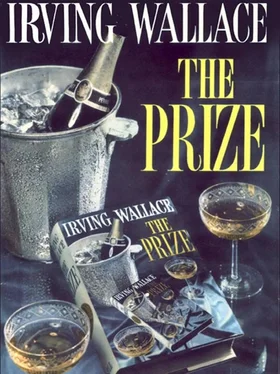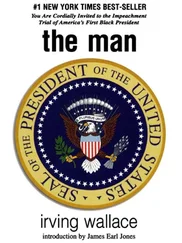‘And you, Count Jacobsson,’ said Denise, ‘what do you like the most?’
Jacobsson was startled, and then he smiled. ‘I concur with the majority. I am only an innocent bystander.’ He considered this a moment, and recollected his Notes, and then he added, ‘As a matter of fact, the 1957 medical award-which was a case of overlapping and might very well have been the chemistry award, instead-that one gave me a good deal of satisfaction, because it was deserving, and, as one advanced in years, I had profited by it. I am sure you know of Dr. Daniel Bovet’s discoveries. He was a Swiss who became an Italian citizen. For a while, I believe, he worked at your Institute in Paris.’
Denise nodded. ‘Yes, shortly before our time.’
‘Bovet made three thousand experiments in four years. As a result, he produced the sulphurs, and the great anti-allergy drugs-anti-histamines, and synthetic curare to be used as a muscle relaxant in surgery, and so on. In your Paris, Bovet fell in love with the daughter of a former Premier of Italy-her name was Filomena Nitti-and he told the press, “I proposed immediately. It was a lightning chemical reaction.” After that, they worked together like the Curies, and Joliot-Curies, and yourselves. I think it is wonderful, a man and wife, to have so major a common interest.’
Claude squirmed, and Denise glared at him, and the last was not lost on Count Jacobsson. Claude fished for his silver cigarette case, and Jacobsson, while mystified, sensed the ferment in the room.
Instinctively, Jacobsson wanted this couple to be happier, to be drawn closer together. He wanted to inform them of how happy Marie Curie, the first woman to win the prize, had been to share it with her husband, and how sad she had been, when she arrived in Stockholm for her second prize, to come without him, for Pierre Curie had been killed in an accident in 1906. Jacobsson wanted to tell them how well another husband-wife team, Drs. Gerty and Carl Cori, who had won the medical prize for isolating enzymes, had got on together and were a family. But somehow, Jacobsson felt that this might not be the time for such examples. Yet there was his job and the dignity of the awards, and he must think of something to give the Marceaus subtle warning. Then he thought of Irène and Frédéric Joliot-Curie, who had shared the $41,000 prize in 1935, and with them he thought that he might make his point.
‘Indeed, you are in a select circle,’ Jacobsson told the Marceaus. ‘You are only the fourth husband-and-wife pair in our history to win the prize. We are sentimental about such awards, and the winners, with one exception, have made us proud.’
‘One exception?’ said Denise carefully.
‘I am thinking of your countrymen, Irène and Frédéric Joliot-Curie, who won the chemistry award for their discoveries in radioactive elements.’
‘What of them?’ asked Denise.
‘They earned the award for artificial radium, and they received it here in Stockholm, and we would give it to them again. But their subsequent history, after the prize, was-in some respects-unfortunate.’
‘They were a devoted couple,’ said Denise sharply, with an eye on her husband.
‘Oh, yes, yes, nothing like that,’ said Jacobsson hastily. ‘Indeed, they were heroes of the Second World War. Frédéric Joliot-Curie stole the world’s greatest supply of heavy water-then important in atomic research-from under the noses of the Nazis in Norway. He got it safely to England. And in France, despite the Gestapo, he organized eighteen underground laboratories to make incendiary bottles for the maquis. I have no doubt you know all that.’
‘Yes, we do,’ said Denise.
‘It was their activity after the war that most Swedes deplored,’ said Jacobsson. ‘Frédéric joined the French Communist Party. And Irène Joliot-Curie told an American visitor that the United States was uncivilized, and that the working-men should overthrow the government. I remember more that she said, for I have recorded all in my Notes. She told the American, “You are deliberately fomenting war. You are imperialists, and you want war. You will attack the U.S.S.R., but it will conquer you through the power of its idea.” I tell you, this caused much headshaking in the Swedish Academy of Science.’
‘Unfortunate,’ said Claude. ‘However, surely you judge by the scientific achievement of your laureates, not by their personal activities.’
‘True,’ said Jacobsson. And then, he added slowly, ‘Still, our laureates are so much looked up to, so widely respected, that when they commit scandals, we are unhappy-extremely unhappy.’
The shaft, motivated by instinct and not information, hit its targets, Jacobsson was certain. For Denise regarded her husband coldly, and Claude avoided her gaze and lifted his heavy-set frame from the sofa.
‘I am eager to see the room where the chemistry awards are voted,’ announced Claude.
Jacobsson rose. ‘I had better explain that the room you will see is not exactly where the balloting takes place. In this room, the Committee for Chemistry often holds the preliminary meetings that lead to the recommendation of the ultimate winner. The actual final balloting, ever since 1913, takes place in the session hall of the Royal Swedish Academy of Science building, located at Frescati just beyond central Stockholm.’
Now the three of them walked through the Executive Director’s office into the corridor, and then into what Jacobsson called the conference room of the Nobel Foundation.
‘Here,’ said Jacobsson, as they stood inside the door, ‘is where the Nobel committee-men determined upon the two of you as the favourites for the prize in chemistry, and where the physics branch weeded Professor Stratman and several others out as the foremost candidates for the prize in physics.’
The Marceaus surveyed the green room. It had none of the shine of a tourist showcase and none of the petrified appearance of archives. It conveyed the impression of a room in which living men did living work and did it frequently. Most of the conference room was filled by the table, its surface overlaid with leather, worn and beaten, and surrounded by ten chairs covered with oxhide. Directly across, overlooking the table, hung a large oilpainting of Alfred Nobel, seated, the work executed posthumously in 1915.
Jacobsson led the Marceaus around the room anti-clockwise. To the right, a long marble ledge ran along the wall, and on top of it were boxed red-bound albums. Jacobsson removed one album. ‘In each album, we keep photographs of our laureates, autographed whenever possible. The day after the final Ceremony, you will be asked to come here to receive your cheque and to sign your photographs.’ He opened the album. ‘Here you see signed photographs of two fellow chemistry winners. This is Professor Richard Kuhn, of the University of Heidelberg, who was voted the 1938 prize for his work in vitamins. And on this page is Professor Adolph Butenandt, of the University of Berlin, who shared the 1939 prize for his work on sex hormones. As you know, Hitler would not allow his subjects to accept the Nobel Prize. Both Kuhn and Butenandt were forced to refuse it. However, in 1948, after the war and Hitler’s death, these two wrote to thank us for the honour which they had wanted but not been permitted to accept. We gave them their gold medals and diplomas, but could no longer give them the prize money. By regulation, it had been held one year, and then returned to the main fund. Too bad, too bad.’
Jacobsson restored the album to its case, then indicated a lively portrait of a woman, hanging above the ledge.
‘Alfred Nobel’s mother painted by Anders Zorn,’ he said. ‘Nobel had tremendous affection for her. Even when he was travelling, he tried to come back to Stockholm annually for her birthday. She died six years before he did.’
Читать дальше












